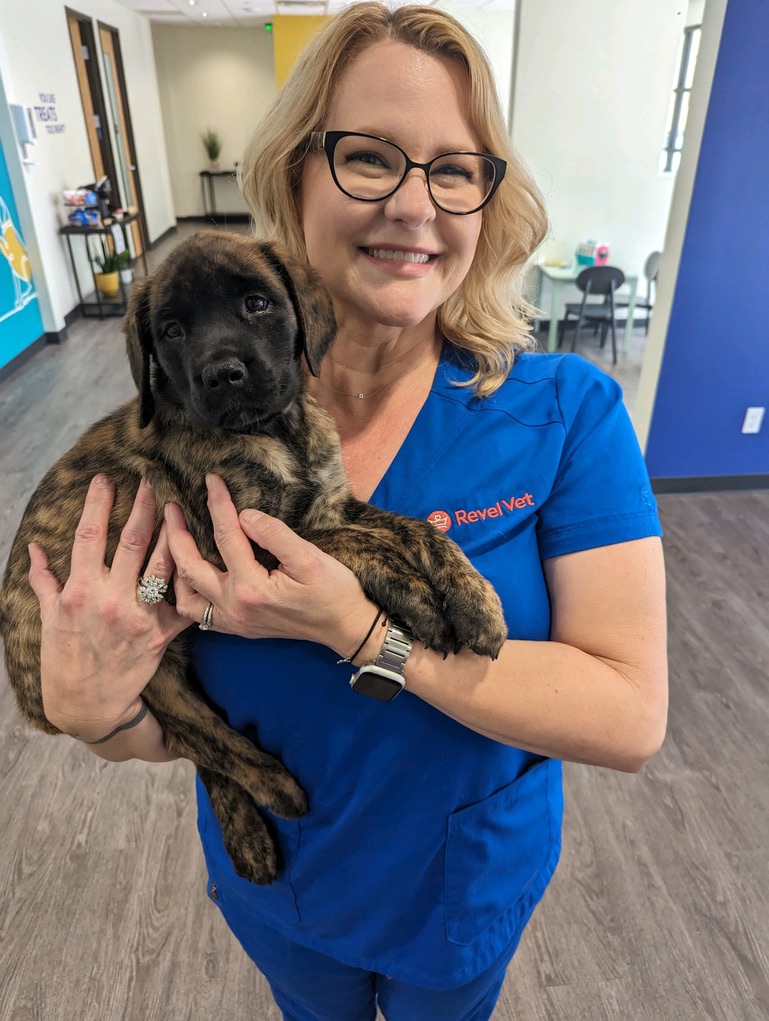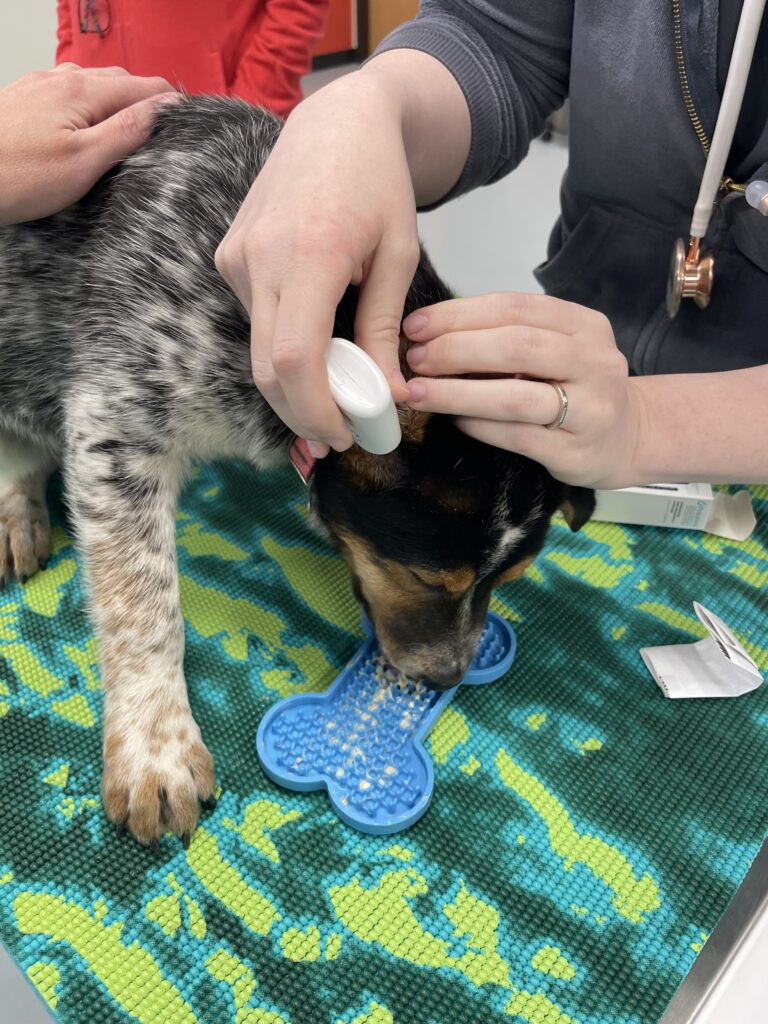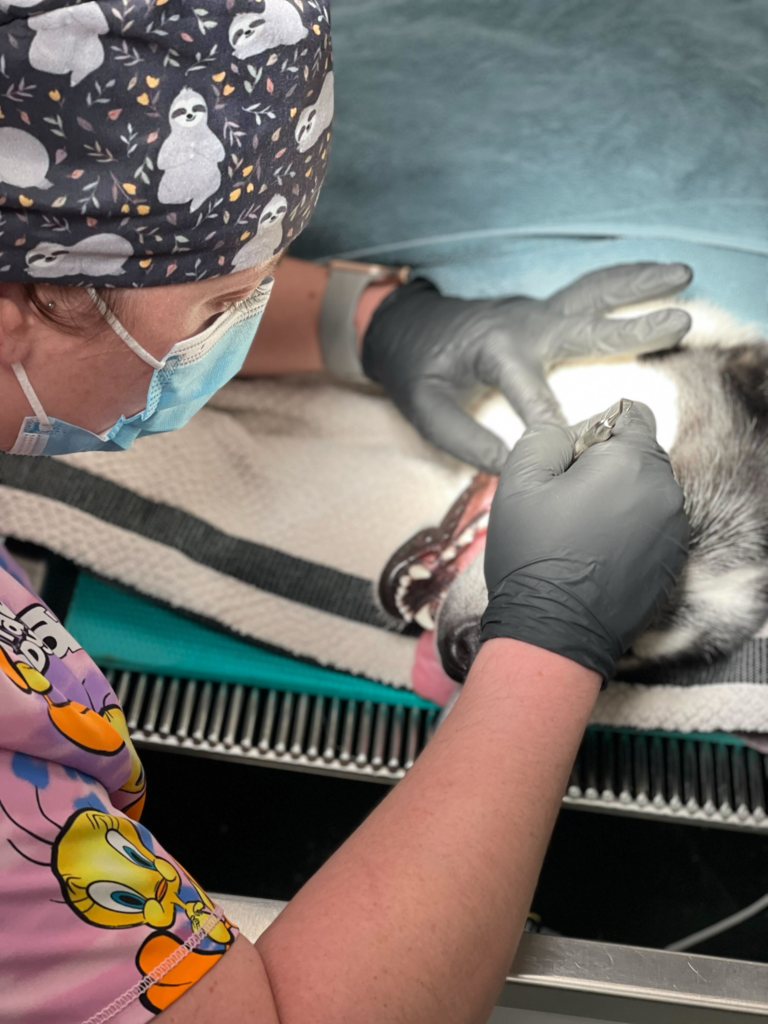
Pet Physical Exam in Queen Creek, AZ
Preparing for Your Pet’s Physical Exam
Regular physical exams are essential for maintaining your pet’s health, providing a baseline for early detection of diseases that may not be noticeable to owners. Catching health issues early can lead to simpler, more cost-effective treatments.
Benefits of physical exams for pets also include:
- Providing the pet with necessary vaccinations, parasite control, and advice on nutrition and weight management, helping to prevent diseases before they start
- Examination of your pet’s teeth and gums to identify early signs of dental issues
- Assessment of your pet’s behavior to provide advice on behavioral issues or changes that might indicate health problems
- Helping pets become accustomed to veterinary settings, reducing stress during medical procedures, and build trust between the veterinarian, the pet, and the owner
Looking for reliable diagnostic care for your pet? See how our state-of-the-art tests and screenings help keep your furry friend healthy.
Preparing for Your Pet’s Physical Exam
Preparing for your pet’s physical exam at Revel Vet is simple and ensures an effective visit. Start by gathering all your pet’s medical records, including tests, vaccinations, and treatment notes, as these provide a comprehensive view of their health history.
The Client Services Team at Revel Vet can help transfer these records from your previous vet, ensuring everything is ready for the appointment.
Schedule your pet’s exam in advance to secure a convenient time and allow the clinic to prepare.
Making sure your pet is clean on the day of the exam to facilitate a thorough check-up and keep the process pleasant for all.

The Physical Exam Process
The physical exam process for your pet at a veterinary clinic is a thorough procedure designed to assess your pet’s overall health and detect any potential issues early.
Here’s what to expect during a physical exam at a veterinary clinic:
- Observation of your pet’s overall demeanor, appearance, and behavior. This initial observation can provide clues about their general health and comfort level.*
- Vital signs including temperature, heart rate, and respiration rate are checked to ensure they are within normal ranges. This is crucial as deviations can indicate hidden health problems.
- Examination of the eyes, ears, nose, and mouth to look for any signs of infection, inflammation, or abnormalities.
- Check for any signs of parasites, allergies, infections, or other skin conditions.
- Palpation of the body to check for abnormalities like lumps, bumps, or tenderness, which could indicate issues beneath the skin.
- Listening to heart and lungs using a stethoscope to check for any irregularities, such as abnormal heart rhythms or respiratory issues.
*Revel Pet’s fear-free process helps ensure the exam is conducted in a way that minimizes stress for your pet. During your pet’s physical, your pet’s FAS score will also be determined to help Revel best determine how to make your pet as calm as possible for any vet visit. Additional information on the FAS process can be found on the Fear Free website here.
Additional Tests and Screenings
Additional testing and screenings are vital for uncovering health issues in pets that aren’t obvious during a physical exam. These tests can reveal underlying conditions early, leading to timely treatment and more effective management of your pet’s health.
Bloodwork and Urinalysis
Bloodwork and urinalysis are key tools in veterinary medicine to check for underlying health issues. Blood tests can evaluate various bodily functions, including liver and kidney health, and check for signs of infections, diabetes, or hormonal imbalances. Urinalysis helps diagnose urinary tract infections, kidney disease, and can also indicate diabetes.
Fecal Exam for Parasites
Common parasites found in pets through fecal exams include:
- Hookworms: These are intestinal parasites that can cause anemia and gastrointestinal symptoms. They are typically spread through ingestion of larvae in the environment.
- Roundworms: Common in dogs and cats, roundworms can affect pets of any age and are often spread through contaminated soil or feces.
- Whipworms: These affect a pet’s intestines and are spread through ingesting contaminated soil.
- Giardia: A protozoan parasite that causes diarrhea and is spread through contaminated water.
Prevention of parasites is typically managed with regular deworming treatments and maintaining a clean environment to minimize exposure to infectious stages of these parasites.

X-Rays or Ultrasounds
X-rays or ultrasounds may be recommended based on findings during the physical. These imaging tools help visualize internal organs and structures, providing valuable information for diagnosing conditions that cannot be detected through external examination alone.
Looking for Common Diseases and Conditions
Screening for heartworm: This is crucial for pets, especially in areas where mosquitoes are common, as mosquitoes transmit heartworm larvae. Regular screening and preventive medications are vital to protect pets from this potentially fatal condition.
Screening for diabetes: Regular screening for diabetes involves checking blood sugar levels and may include urinalysis. Early detection allows for better management of the disease through diet, exercise, and insulin therapy if needed.
Importance of Annual Dental Exam
An annual dental exam is crucial for maintaining your pet’s overall health. Like humans, pets can suffer from dental issues, which if left unchecked, can lead to serious health complications. Regular dental exams allow veterinarians to check for signs of periodontal disease, tooth decay, and other oral health problems. These exams often include cleaning, which removes plaque and tartar buildup that can cause gum disease and tooth loss.
Preventing Periodontal Disease
Periodontal disease is one of the most common dental issues in pets and can lead to painful infections and tooth loss. Prevention is key and involves several steps:

- Brushing your pet’s teeth daily with pet-specific toothpaste to significantly reduce plaque buildup
- Feeding your pet specially formulated dental diets and treats to reduce plaque and tartar buildup
- Chew toys can also help manage plaque and keep your pet’s teeth stronger and cleaner
- Regular professional cleanings by a veterinarian to remove plaque and tartar buildup that home brushing can’t manage
Discussing Results and Recommendations
After your pet’s physical exam and any additional tests, the findings are reviewed thoroughly to ensure you understand your pet’s health status and any medical issues discovered. The veterinarian will explain the results of the physical exam and tests such as blood work, urinalysis, or imaging studies, noting any abnormalities.
This review session is a crucial time for you to ask questions and discuss any unusual behaviors or symptoms you’ve noticed in your pet. Based on the findings, the vet will recommend specific treatments or changes, possibly including diet adjustments, lifestyle changes, medications, or preventive measures.
If further investigation or treatment is needed, the vet will also plan follow-up care, which might involve more tests or regular check-ups to monitor your pet’s condition.
This comprehensive approach helps ensure that you are fully informed about your pet’s health and involved in the care process.
The Revel Vet Difference
Revel Vet sets itself apart from other veterinary clinics by its dedicated approach to fear-free practices, state-of-the-art facilities, and a strong commitment to personalized care.
Here’s what makes Revel Vet a distinct choice for pet owners:
- At Revel Vet, we prioritize creating a stress-free environment for both pets and their owners. Understanding that veterinary visits can be stressful, our staff is trained in fear-free techniques designed to reduce anxiety and fear in pets during their exams and treatments.
- By ensuring that the animals are calm and relaxed, veterinarians can perform more thorough and accurate examinations, leading to better health outcomes. Fear-free practices help build trust, making pets more likely to respond positively in future visits.
- Revel Vet is equipped with the latest in veterinary technology, which allows for comprehensive diagnostics and efficient treatment. This includes digital imaging systems, in-house laboratory services, and advanced surgical facilities.
- Our team takes the time to get to know each pet and owner, tailoring our recommendations and treatments to the specific needs and circumstances of each case.
Together, these elements define the Revel Vet difference, emphasizing why our clinic is a leader in veterinary care and a trusted choice for pet owners seeking compassionate and skilled veterinary services.
Want to ensure your pet’s spay or neuter procedure is stress-free? Explore our specialized Fear-Free approach to make the experience as gentle as possible.
Schedule Your Pet’s Physical with Revel Vet
When it’s time for your pet’s physical exam, choosing the right veterinary clinic is crucial. At Revel Vet, we understand the unique needs of each pet and offer a compassionate, professional environment that ensures the best care for your animal companion.
Choosing Revel Vet means opting for a veterinary clinic that combines advanced medical technology with a deep commitment to your pet’s mental and physical health.
Commonly Asked Questions About Physical Exams
It’s natural to have questions about your pet’s physical exam, especially if you’re a new pet parent or new to the fear-free environment.
Here’s some guidance on frequently asked questions:
FAQs About X-Rays at Revel Vet
How Often Should My Pet Receive a Physical Exam?
It’s recommended that pets receive a physical exam annually to ensure they are in good health. At times, more frequent exams might be necessary depending on certain circumstances, including puppies and kittens, senior pets, or those with chronic conditions.
Are There Any Specific Concerns I Should Have For My Pet’s Age or Breed During a Physical Exam?
Understanding common breed-specific conditions and what to expect as your pet ages is important. Many breeds have predispositions to certain genetic conditions, such as hip dysplasia in large dogs or heart issues in certain cat breeds. Early detection and management of these conditions can significantly improve the quality of life.
Give Us A Call
Phone: (480) 701-8609
We are at the intersection of Ellsworth and Riggs, in the parking lot with Backyard Taco and Desert Mountain Equine.